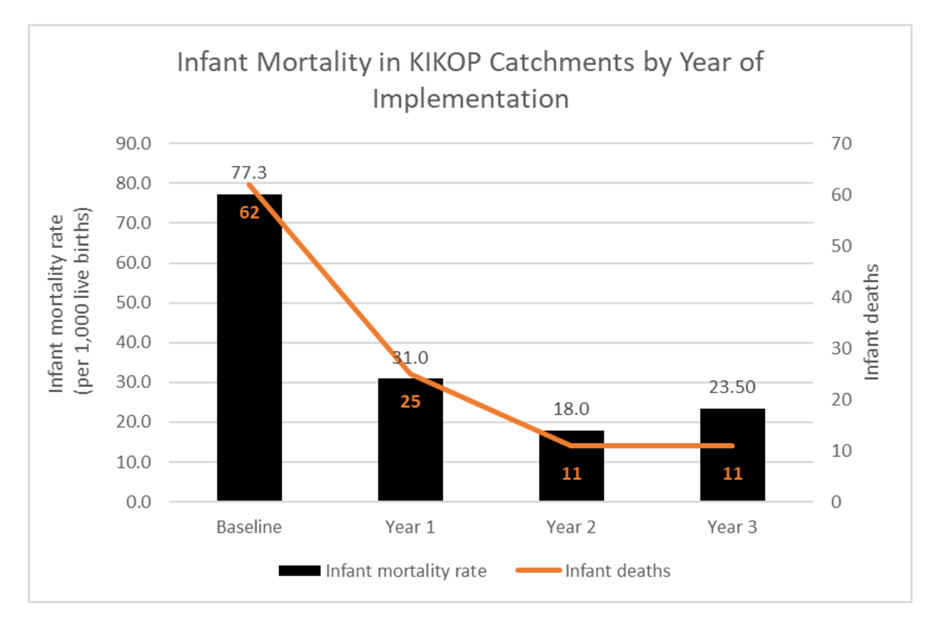2022 Recap: Program Highlights and Achievements
- kikoplead
- Jan 3, 2023
- 3 min read
Program Highlight: More than 2,000 Moms Reached in 2022
In 2022, Community Health Volunteers and Health Promoters conducted over 2,000 visits to pregnant women and mothers of young children providing key health messages to mothers and families. CHVs from neighboring communities convene for monthly meetings to clean data and share any successes or barriers they’ve come across while visiting pregnant women and mothers. The data that is consolidated from these meetings is used to track progress on various maternal and child health indicators.

Community Health Volunteers were gifted flour and sugar around Christmas by KIKOP management as a show of their appreciation for the many contributions of CHVs

Women attending a Care Group lesson
KIKOP believes Care Groups are key to promoting positive health behavior changes.
In the first quarter of 2023, over 2,000 women of reproductive age were reached with Care Group lessons. The lesson topics included gender-based violence, newborn dangers signs, deworming, fecal-oral transmission of bacteria, pneumonia prevention, HIV, menstrual hygiene, malaria prevention and antenatal care. The lesson plans were designed using the findings from an analysis that was conducted in 2022 about changes in health behaviors and health outcomes.

Mothers practice making nutrition-rich foods during a Care Group lesson
Data Report: Summary and Select Indicators
In 2022, there were no maternal deaths for the 420 live births that occurred in the project catchment areas. The infant mortality rate also declined drastically from 77.3 at baseline to 23.5 in the third year of programming.


KIKOP also saw improvements in the percentage of mothers who were able to choose their delivery position from 15% in 2021 to 36% in Q3 2022. The percentage of mothers who completed four or more prenatal visits increased from 58% in 2021 to 71% in Q3 2022, even with a county-wide nurse’s strike. The percentage of mothers who stated that their partner attended at least one prenatal care visit declined, however, from 60% in 2021 to 50% in Q3 2022. In the first quarter of 2023 (January 1, 2023 – March 31, 2023) there were no maternal deaths, no stillbirths, and one child death.

Obstetric and Neonatal Emergency Training
KIKOP has made significant strides in reducing maternal and infant mortalities, but perinatal mortalities (deaths that occur in the later stages of pregnancy until the very first week of life) remain high. To address high perinatal mortalities, KIKOP worked with Irene Felsman, an assistant professor at Duke University School of Nursing and member of Curamericas Global’s Advisory Board, to provide training on the triage and referral of obstetric and neonatal emergencies for 25 nurses from across KIKOP’s partner facilities. The training will enable staff to prioritize obstetric emergencies and better recognize when patient referrals are needed to help reduce the number of perinatal mortalities.

Attendees of the obstetric and neonatal emergencies training
Water Quality Monitoring Training
In KIKOP’s partner facilities, diarrhea is the third leading cause of outpatient services. Public health authorities in Kisii County believe this can be attributed to contaminated drinking water. In response, Dave Heiser, a Senior Environmental Engineer and Water Consultant on Curamericas Global’s Advisory Board, provided water quality monitoring training to Community Health Volunteers, Health Promoters, and Ministry of Health personnel. In the training, participants learned how to complete and read water tests using water from their own communities. KIKOP will work with government and community partners to continue to monitor and promote water quality in the communities served.

Community Health Volunteers, Health Promoters, and Ministry of Health personnel learn about conducting water quality monitoring tests

Community Health Volunteers, Health Promoters, and Ministry of Health personnel test the water in their communities







Comments